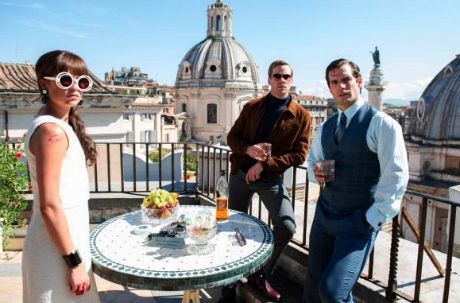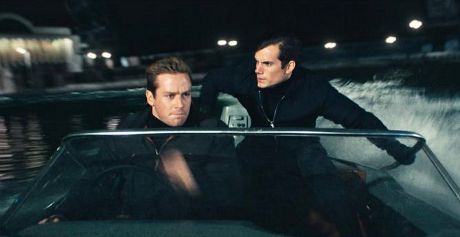I felt next to nothing last night as I watched Guy Ritchie‘s The Man From U.N.C.L.E. (Warner Bros., 8.7) with a crowd of second-string, all-media loser types at the Arclight. I didn’t “hate” it and I’ll admit that I chuckled two or three times, but I mostly felt anesthetized — suspended in the tepid depths of the thing. The screenplay (written by Ritchie and Lionel Wigram) delivers a form of dry meta-comedy mixed with the same old running-around-Europe action spy stuff, but I have to acknowledge that stylistically and attitudinally it’s up something that’s lightly skewed — an aloof cool-cat vibe that sets it apart from the usual usual. The problem is that this stuff doesn’t kick in very often.

(l. to r.) Alicia Vikander, Army Hammer, Henry Cavill in Guy Ritchie’s The Man From U.N.C.L.E.
About halfway through I was thinking about hitting the head but I talked myself out of it for fear of missing something (a good joke, a clever bit). If you put off a bathroom break it doesn’t mean that a film is necessarily stupendous, but it does suggest it might be doing something half-right.
And yet U.N.C.L.E. is a kind of light genre comedy with a split personality. On one hand it seems to despise action-flick conventions by ironically satirizing them and making dry little jokes, and on the other it subjects the audience to the same formulaic bullshit that you’ve seen in a hundred spy movies.
I was also telling myself that I like Henry Cavill‘s Napoleon Solo. He’s cool to hang with for his good looks and take-it-easy vibe, but mainly because of his droll, meta-blase way of saying his lines. He’s adapting to the basic meta attitude, of course, but I felt relaxed when he was in the room. I also admired Cavill’s performance in Man of Steel, despite having despised the film. I was saying to myself, “We need more guys like Cavill in movies and fewer schlumpies and dumpies.” Cavill just has to be careful to avoid that flirting-with-Ernest-Borgnine look that he exhibited last year at ComicCon.
The Man From U.N.C.L.E. contains three scenes that exude an amusingly detached “humor” element. The quotes mean “not exactly funny but enough to make you grin slightly.”
Amusingly detached scene #1 happens in a hotel room with Army Hammer‘s Ilka Kuryakin feeling uncomfortable about and resistant to the fact that Alicia Vikander‘s Gaby Teller has decided to start dancing for no reason — feeling the music, going with the groove — and Kuryakin is grimacing and staring at the floor and saying to himself, “I don’t like this energy…this is not right.”
Amusingly detached scene #2 involves Solo’s abrupt decision to detach from a major threat scenario (i.e., bad guys chasing him and Kuryakin around a harbor with machine guns) when he steps into a truck cab and decides to enjoy some wine and a baguette sandwich while Kuryakin is still roaring around in a speedboat and dodging hot lead.
Amusingly detached scene #3 involves a bad guy being electrocuted off-screen while Solo and Kuryakin are discussing another matter and ignoring the sound of humming electricity and sizzling flesh.
Nonetheless U.N.C.L.E. never lifts off the ground, and that meant I was constantly aware that I was sitting in a seat and waiting for something big to happen. When films become airborne and catch the proverbial groove you’re totally immersed in their realm and feeling a sense of immediate and riveting identification with the characters. This definitely wasn’t happening last night, but I wish I could have seen it with Steven Soderbergh so he could tell me what he wanted to do with the basic material before he left the project and Guy Ritchie came in and Ritchie-ized it.

U.N.C.L.E‘s opening credit sequence is very cool, I must say. Very mid ’60s. Hats off to the designers. And some of the musical tracks are nice — “Compared To What” (Roberta Flack), “Cry To Me” (Solomon Burke), “Five Months, Two Weeks, Two Days” (Louis Prima), “Take Care Of Business” (Nina Simone).
The film takes place in ’63, which right away allows for a trove of jokes about how people saw the world back then and how values and viewpoints have changed quite dramatically. Hardly anyone had heard of the Beatles or LSD or social protest back then, homosexuals were fairies and faggots, and people of African-American heritage were called “negroes” and regarded paternally as jazz musicians, boxers and athletes and not much else. A clever screenwriter could have a field day satirizing how people thought in the final year of the Kennedy administration, but Ritchie and Wigram don’t even flirt with this.
I was amazed to speak to people afterwards who were saying “that was fun!” and “I loved her performance” and so on. Some people are just easy lays. Next to no taste, not wanting to be “negative,” etc.
The worst performance in U.N.C.L.E. is given by Elizabeth Debicki, who plays a villainess with the same blank-faced robot personality that a hundred other villains have used in a hundred action films. Her performance is nothing and yet a middle-aged woman was standing last night in the Arclight lobby and saying how great Debicki was. “What’s so great about playing an evil, stone-faced robot mannequin as if you’re an actual real-life robot mannequin playing an evil, stone-faced baddie?” I asked. “She’s cold,” the woman said. “Yeah,” I said, “which is analogous to being an emotionless robot…devoid of spirit, humor, attitude…I don’t know what you’re talking about, Jesus.”
Why did they even make this movie? Will they even make money with it? It feels to me like a tank. But Henry Cavill has “it,” I feel, and he deserves to work with better material and better directors than Ritchie and Zack Snyder.









